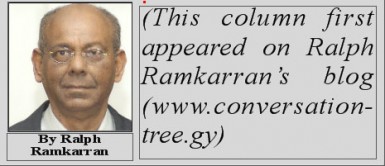The Demerara Slave Rebellion of 1823 was a seminal event in the history of slave resistance in British Guiana and in the colonial world. Its stark exposure, once again, of the horrors of slavery speeded up its demise even as growing anti-mercantilist trends were ravaging its economic foundations. Jack Gladstone was the rebellion’s principal organizer and leading militant. While he has not been forgotten by history, his monumental, though costly, contribution to the abolition of slavery in 1838 and the advancement of freedom is little known. Professor da Costa’s book, Crowns of Glory, Tears of Blood – The Demerara Slave Rebellion of 1823, restores Jack Gladstone’s place in the narrative of resistance, but popular recognition and full knowledge of his role have still eluded his contribution to the freedom struggle.
 The two most prominent figures who emerged from the rebellion are Quamina and the Rev John Smith. Quamina was a skilled carpenter at Plantation Success. He had become a Christian in 1808 and was later appointed a deacon. He was trusted and relied upon by both Rev Smith and his predecessor Rev Wray in church affairs. He was enslaved from birth, a proud and dignified man and a dedicated worker. He had suffered, like all others enslaved, from severe punishment by way of beatings and confinement.
The two most prominent figures who emerged from the rebellion are Quamina and the Rev John Smith. Quamina was a skilled carpenter at Plantation Success. He had become a Christian in 1808 and was later appointed a deacon. He was trusted and relied upon by both Rev Smith and his predecessor Rev Wray in church affairs. He was enslaved from birth, a proud and dignified man and a dedicated worker. He had suffered, like all others enslaved, from severe punishment by way of beatings and confinement.
Rev John Smith, a man of “modest origins,” had himself been an artisan apprentice and had experienced “poverty and privation.” He and his wife Jane arrived at Le Resouvenir in British Guiana in February, 1816, to replace Rev John Wray, by which time the campaign for abolition had attracted much support and was influencing missionaries. He became strengthened in his view about the “helplessness and innocence” of slaves and the “sinfulness and godlessness” of planters after seeing on the journey from the city the hovels of slaves and the manicured lawns and mansions of the planters.
There had been growing tensions between planters and missionaries as a result of a dispute about teaching slaves to read. Planters, including Lieutenant-Governor John Murray, felt that if slaves knew how to read, they would become agitated by the various proclamations and abolitionist writings which were being published. Missionaries felt that it was necessary for the slaves to learn to read so that they could read the Bible. Animosity grew against Rev John Smith to such an
